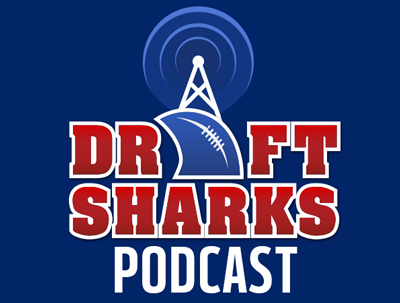In This Article
Devonta Freeman's 2018 Fantasy Football Outlook

Note: This is a FREE preview of a Draft Sharks player profile. Become a DS Insider today to get instant access to 250+ profiles.
What You Need to Know:
- Injuries and a declining pass-catching role sunk Freeman to 13th in PPR points and 12th in non-PPR among RBs last year.
- He remained busy and productive on the ground, averaging 15.2 carries and 68.4 rushing yards in 12 full games.
- Freeman should play a similar role in 2018 and remains a solid bet for low-end RB1 production.
A down 2017
Freeman was a relative disappointment last year. After leading all RBs in fantasy points in 2015 and then ranking 6th in 2016, he dipped to 13th in PPR points and 12th in non-PPR.
Injuries were the biggest culprit. He was knocked out of Week 10 after just 2 snaps with a concussion — his 2nd in a 3-month span — and missed the following 2 games. He also missed some time late in Week 8 with a shoulder injury, hurt his knee in Week 9 and revealed after the season that he’d been playing through MCL and PCL sprains.
When Freeman was on the field, though, he remained productive for fantasy squads. In 12 full games (omitting Weeks 8 and 10), Freeman averaged 16.2 PPR points. That trailed his 2015 (21.4) and 2016 (17.9) marks but would have ranked him 8th among RBs over the course of a full season.
Freeman averaged 15.2 carries and 68.4 rushing yards in those 12 full games. Those marks were down from 2015 but up from his 14.2 carries and 67.4 yards in 2016. He averaged a solid 4.4 yards per carry — a tad better than his career average entering the season — and ranked 14th among 51 RBs in Pro Football Focus’ run grades.
Freeman also remained Atlanta’s top dog near the end zone. He out-carried Tevin Coleman 21 to 13 inside the 10-yard line and 14 to 6 inside the 5 last year. Freeman’s 6 TDs from inside the 5 tied for 3rd league-wide.
Declining pass-catching role
It was a different story in the passing game, where Freeman set 3-year lows across the board — in both raw and per-game stats. He averaged 3.7 targets, 2.9 catches and 24.8 yards across those 12 full games. That followed 6.5 targets, 4.9 catches and 38.5 yards in 2015 and 4.1 targets, 3.4 catches and 28.9 yards in 2016.
Atlanta’s RB target share was down in OC Steve Sarkisian’s 1st season. The position combined for 19.5% of the targets in 2015 and 19.9% in 2016. That sunk to 16.8% this past year.
Freeman’s share of the RB targets declined, too. He hogged 80.2% of the pie in 2015, 60.7% in 2016 but just 52.8% last season. Coleman, meanwhile, saw a career high 43.8% of the Falcons’ RB targets.
2018 outlook
Coleman is back for 2018, the final year of his contract. Julio Jones, Mohamed Sanu and Austin Hooper also return. And Atlanta seemingly upgraded at WR, swapping out Taylor Gabriel for 1st-round rookie Calvin Ridley. So it’s tough to project Freeman to return to even his 2016 levels of pass-catching production.
He should still remain the clear lead dog in this backfield, though. While Coleman is set to hit the free-agent market next offseason, the Falcons committed to Freeman last August by handing him a 6-year, $43 million extension. Only Le’Veon Bell on the franchise tag sits above Freeman in average annual salary among RBs. At 26 years old, he’s still smack dab in his prime.
Freeman will also benefit from running behind a strong offensive line that returns 4 of 5 starters from a unit that ranked 8th in Football Outsiders’ 2017 Adjusted Line Yards. And new RG Brandon Fusco looks like an upgrade on 2017 starter Wes Schweitzer. While Schweitzer finished 48th in Pro Football Focus’ run-blocking grades last year, Fusco ranked 23rd.
Durability concerns?
The biggest concern heading into 2018 might be all those injuries Freeman suffered last year. The concussions were his 2nd and 3rd as a pro. The MCL and PCL sprains didn’t require surgery but were still bothering Freeman as of early May. We’ll be keeping a close eye on him when training camp opens. It’s certainly worth noting, though, that Freeman missed just 1 game (with his 1st concussion) across 2015 and 2016.
Draft Sharks Bottom Line:
Freeman was relatively disappointing last year, finishing 13th among RBs in PPR points and 12th in non-PPR. He missed a little more than 3 full games but also saw his passing-game role shrink.
While that might not rebound to 2015 or 2016 levels, Freeman remains the clear lead dog in a good offense behind a strong O-line. Atlanta committed to him with a big contract last summer, and he’s still in his prime at 26.
Tevin Coleman’s presence caps Freeman’s upside and keeps him from the top half of RB1 territory. But he remains one of the more proven bets among the lower-end of RB1 candidates.


 Redraft
Redraft






